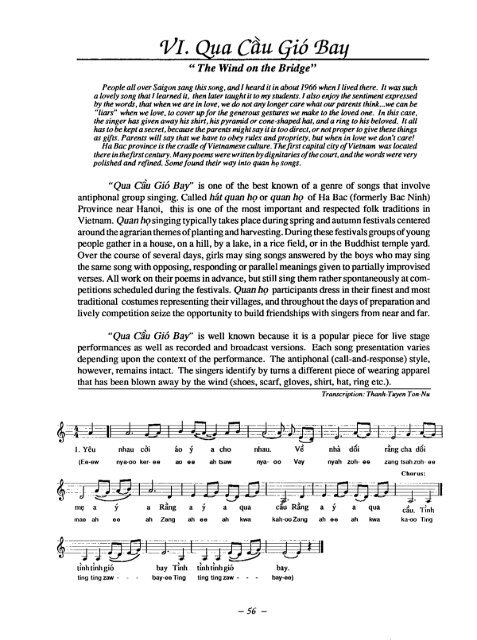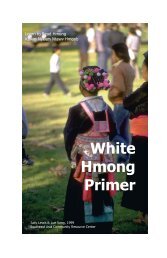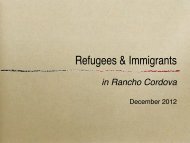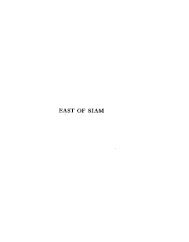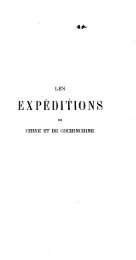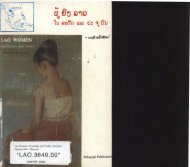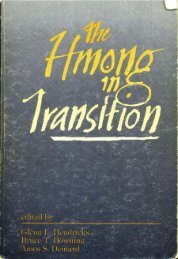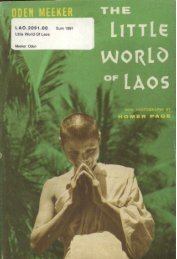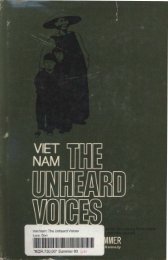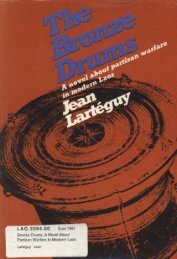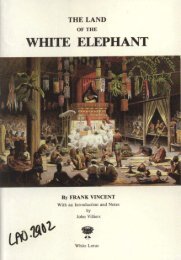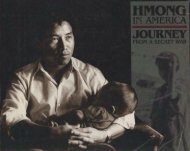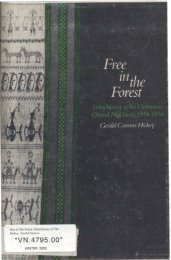and Temple Yards
iutnam From Rice Paddies and Temple Yards - Refugee Educators ...
iutnam From Rice Paddies and Temple Yards - Refugee Educators ...
- No tags were found...
Create successful ePaper yourself
Turn your PDF publications into a flip-book with our unique Google optimized e-Paper software.
%!I. Qua C&u Gib Bay<br />
" The Wind on the Blidge"<br />
People all over Saigon sang this song, <strong>and</strong> 1 heard it in about 1966 when I lived there. It wm such<br />
a lovely song that I learned it, then later taught it to my students. I also enjoy the sentiment expressed<br />
by the wort&, that when we are in love, we do not any longer care what our parenu think ...we can be<br />
"liars" when we love, to cover up for the generous gestures we make to the loved one. In this care.<br />
the singer has given away his shirt, his pyramid or cone-shaped hat, <strong>and</strong> a ring to his beloved. If all<br />
has to be kept a secret, because the parents might say it is too direct, or not proper to give these things<br />
m gif~r. Parenrs will say that we have to obey rules <strong>and</strong> propriely, but when in love we don't care!<br />
Ha Bac province is the cradle of Vietnamese culture. The first capital city of Vietnam was located<br />
there in thefirst century. Many poem were written by dignitaries of the court, <strong>and</strong> the wordr were very<br />
polished <strong>and</strong> refined. Some found their way into quan ho songs.<br />
"Qua C ~ U Gib Bay" is one of the best known of a genre of songs that involve<br />
antiphonal group singing. Called h6t quan ho or quan ho of Ha Bac (formerly Bac Ninh)<br />
Province near Hanoi, this is one of the most important <strong>and</strong> respected folk traditions in<br />
Vietnam. Quan ho singing typically takes place during spring <strong>and</strong> autumn festivals centered<br />
around the agrarian themes of planting <strong>and</strong> harvesting. During these festivals groups of young<br />
people gather in a house, on a hill, by a lake, in a rice field, or in the Buddhist temple yard.<br />
Over the course of several days, girls may sing songs answered by the boys who may sing<br />
the same song with opposing, responding or parallel meanings given to partially improvised<br />
verses. All work on their poems in advance, but still sing them rather spontaneously at competitions<br />
scheduled during the festivals. Quan ho participants dress in their finest <strong>and</strong> most<br />
traditional costumes representing their villages, <strong>and</strong> throughout the days of preparation <strong>and</strong><br />
lively competition seize the opportunity to build friendships with singers from near <strong>and</strong> far.<br />
"Qua C~LI Gib Bay" is well known because it is a popular piece for live stage<br />
performances as well as recorded <strong>and</strong> broadcast versions. Each song presentation varies<br />
depending upon the context of the performance. The antiphonal (call-<strong>and</strong>-response) style,<br />
however, remains intact. The singers identify by turns a different piece of wearing apparel<br />
that has been blown away by the wind (shoes, scarf, gloves, shirt, hat, ring etc.).<br />
Transcripriun: Thanh-Tuyen Ton-Nu<br />
I. YEu nhau cdi go 9 a cho nhau. V& nhi d6i rhg clia d6i<br />
(Ee-ew nya-oo ker- ee ao ee ah tsaw nya- 00 Vay nyah zoh- ee zang tsahzoh- ee<br />
Chorus:<br />
a a a qua g a 9 a qua<br />
mae ah ee ah Zang ah ee ah kwa kah-wZang ah ee ah kwa kaao Ting<br />
tinh tinhgi6 hay ~inh tinh thh gii, bay.<br />
ting ting zaw - - - bay-ee Ting ting ting xaw - - - bay-ee)


